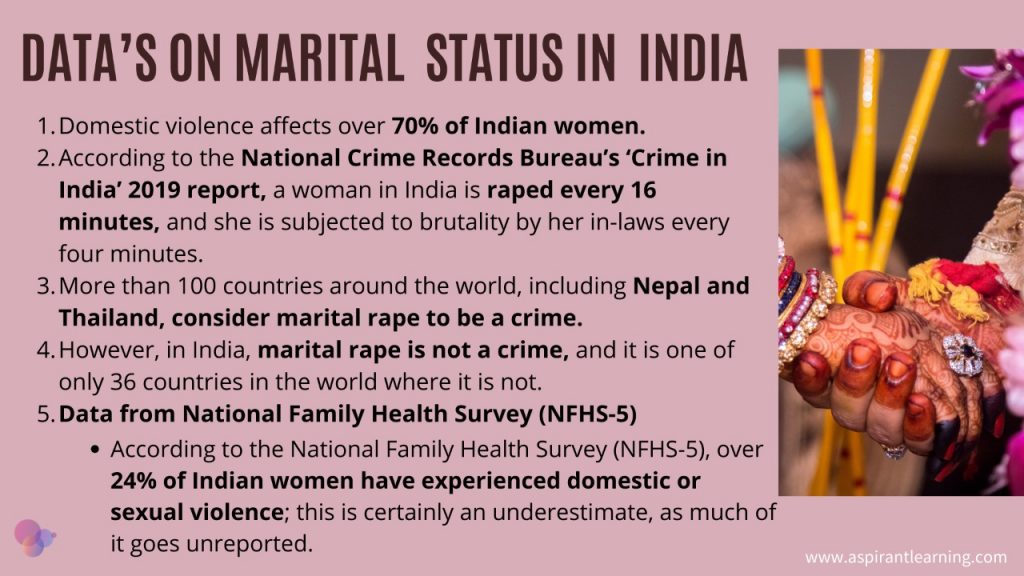News Highlight
SC to hear petitions relating to criminalisation of marital rape: The issue focuses on the exception in rape law in the IPC, which dismisses the idea of rape within marriage.
Key Takeaway
- The Supreme Court will begin the final hearing of a series of petitions seeking to criminalise marital rape on March 21.
- There are three sets of petitions.
- The first is by a Karnataka man being tried for marital rape.
- The top court had, on July 20, 2022, stayed the verdict of the Karnataka high court that put the man on trial for allegedly raping his wife.
- In addition, ignoring Exception 2 to Section 375 IPC that treated such cases as an exception to rape.
- The second set of petitions arose from appeals filed against a split verdict delivered by the Delhi High Court on May 11, 2022, on petitions seeking to criminalise marital rape.
- The third set of petitions is like PILs challenging the constitutional validity of Exception 2 to Section 375 IPC that treated such cases as an exception to the central provision on rape.
Marital Rape
- About
- Marital rape (or spousal rape) is a sexual act committed by one of the spouses without the consent of the other.
- Today, more than 100 nations have criminalised marital rape, yet, India is one of only 36 countries where marital rape remains unpunished.
- Legal provisions
- Section 375 of the IPC defines rape and the idea of consent but adds that these criteria do not apply to married couples.
- Additionally, sexual intercourse between a man and his wife, if the wife is over 15, is not rape.
- Furthermore, there are no other laws or laws that recognise marital rape.
- Victims can only seek civil remedies under the Protection of Women from the Domestic Violence Act of 2005.
Arguments For Criminalising Marital Rape
- Marriage is not a license
- Firstly, marriage should not be considered a licence for a husband to rape his wife without consequence.
- Furthermore, a married woman has the same right as an unmarried woman to regulate her body.
- Bodily Integrity is intrinsic to Article 21
- A woman has the right to decline sexual intercourse with her spouse, according to Article 21 of the Constitution.
- It guarantees the right to bodily integrity and privacy.
- The Supreme Court has interpreted Article 21 to include the sacredness of women and the ability to make sexually active decisions.
- Ensuring the Security of Women
- It will keep women safe from violent spouses and allow them to get the care they need to recover from marital rape.
- Subsequently saving themselves from domestic violence and sexual assault.
Arguments Against Criminalising Marital Rape
- Misuse of law
- It may become an easy instrument for harassing husbands by misusing the law, comparable to the growing misuse of Section 498A of the IPC.
- Implementation issues
- Making marital rape a crime will raise major implementation issues such as the truthfulness of testimony, evidence in court, and so on.
- Destabilise marriage as an institution
- It may cause complete chaos in families and destabilise the institution of marriage.
- Law Commission has not recommended
- After a thorough investigation, the Indian Law Commission and the Parliamentary Standing Committee on Home Affairs did not recommend criminalising marital rape.
- Awareness is more critical
- Simply criminalising marital rape may not be enough to deter it, as “moral and societal awareness” is essential in preventing such an act.

Conclusion
- Marital rape is a complex topic that requires a thorough examination.
- Making marital rape a crime will not only assist.
- Instead, there is a need to correct and address gaps in existing laws, as well as eliminate obsolete ones that tend to work against the well-being of women and society as a whole.
- Public consultation and discussion with all stakeholders could be the way to go.
Pic Courtesy: India Today
Content Source: The Hindu



